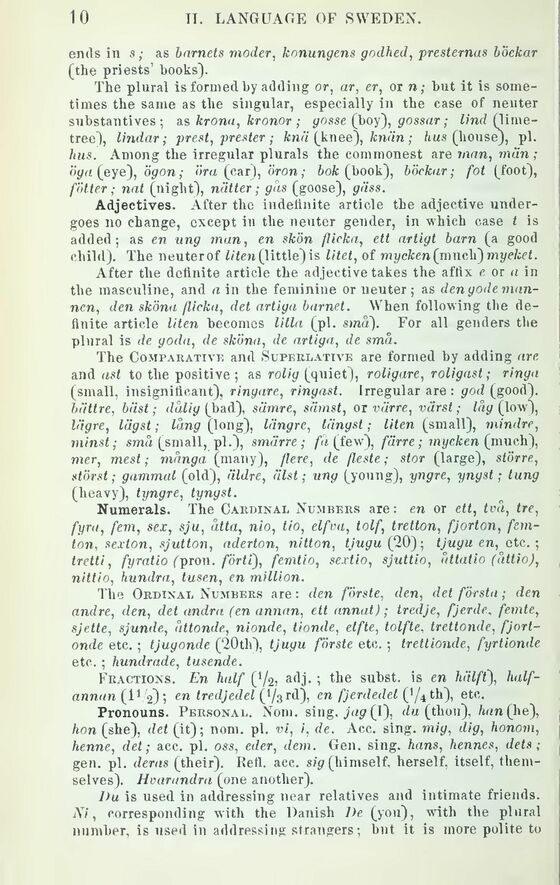
Full resolution (JPEG) - On this page / på denna sida - Sketch of Norwegian and Swedish Grammar, with Vocabulary and List of Phrases - II. The Language of Sweden - Adjectives - Numerals - Pronouns

<< prev. page << föreg. sida << >> nästa sida >> next page >>
Below is the raw OCR text
from the above scanned image.
Do you see an error? Proofread the page now!
Här nedan syns maskintolkade texten från faksimilbilden ovan.
Ser du något fel? Korrekturläs sidan nu!
This page has never been proofread. / Denna sida har aldrig korrekturlästs.
ends in s; as barnets moder, konungens godhed, presternas bäckar
(the priests’ hooks).
The plural is formed hy adding or, ar, er, or n; hut it is
sometimes the same as the singular, especially in the case of neuter
substantives; as krona, kronor ; gosse (hoy), gossar; lind
Qime-tree), lindar; prest, prester; knä (knee), knän; hus (house), pl.
hus. Among the irregular plurals the commonest are man, män;
öga (eye), ögon; öra (car), öron; bok (hook), bockar; fot (foot),
fötter; nat (night), nätter; gäs (goose), gäss.
Adjectives. After the indefinite article the adjective
undergoes no change, except in the neuter gender, in which case t is
added; as en ting man, en skön flicka, ett artigt barn (a good
child). The neuterof liten (little) is litet, of mycken (much) myeket.
After the definite article the adjective takes the affix e or a in
the masculine, and a in the feminine or neuter ; as den gode
mannen, den sköna flicka, det artiga barnet. When following the
definite article liten becomes lilla (pl. små). For all genders the
plural is de goda, de sköna, de artiga, de små.
The Comparative and Superlative are formed by adding are
and ast to the positive; as rolig (quiet), roligare, roligast; rinya
(small, insignificant), ringare, ringast. Irregular are : god (good).
bättre, bäst; daliy (bad), sämre, sämst, or värre, värst; låg (low),
lägre, lägst; lång (long), längre, länyst; liten (small), mindre,
minst; små (small, pl.), smärre; fa (few), färre; mycken (much),
mer, mest; många (many), flere, de fleste; stor (large), större,
störst; gammal (old), äldre, älst; ung (young), yngre, yngst; tung
(heavy), tyngre, tyngst. o
Numerals. The Cardinal Numbers are: en or ett, två, tre,
fyra, fem, ser, sju, åtta, nio, tio, elfva, tolf, tretton, fjorton,
femton, sexton, sjutton, aderton, nitton, tjugu (20); tjugu en, etc. ;
Itretti, fyratio (pron. förti), femtio, sextio, sjuttio, åttatio (åttio),
nittio, hundra, tusen, en million.
The Ordinal Numbers are: den förste, den, det första; den
andre, den, det andra (en annan, ett annat); tredje, fjerde, femte,
sjette, sjunde, åttonde, nionde, tionde, elfte, tolfte, trettonde,
fjortonde etc. ; tjuyonde (20th), tjugu förste etc.; trettionde, fyrtionde
etc. ; hundrade, tusende.
Fractions. En half [}!%, adj. ; the suhst. is en hälft),
half-annun(l1/2); en tredjedel (73rd), en fjerdedel (’/4th), etc.
Pronouns. Personal. Nom. sing, jag (I), du (thou), /tun (he),
hon (she), det (it); nom. pl. vi, i, de. Acc. sing, rniy, dig, honom,
henne, det; acc. pl. oss, eder, dem. Gen. sing, hans, hennes, dets;
gen. pl. deras (their). Refi. acc. sig (himself, herself, itself,
themselves). Hvarandra (one another).
Du is used in addressing near relatives and intimate friends.
A7, corresponding with the Danish De (yon), with the plural
number, is used in addressing strangers; but it is more polite to
<< prev. page << föreg. sida << >> nästa sida >> next page >>